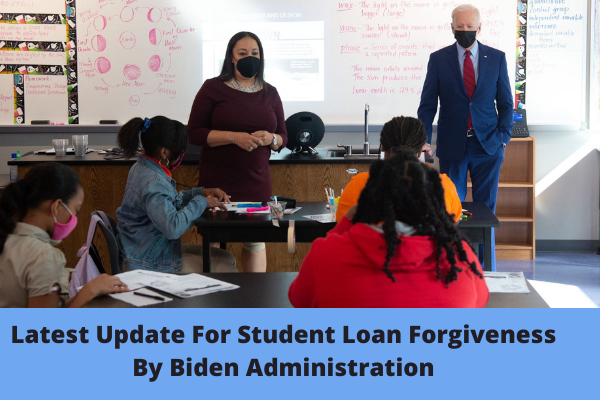Biden Administration declares a ‘state of emergency to protect student loan borrowers from predatory student debt collectors to modify the concerned Public Service Loan Forgiveness (PSLF) program.
The administration unveiled a new measure on Tuesday to help millions of distressed borrowers who have been trapped in a debt cycle. Under the action, student debt collectors will be prohibited from charging penalties to those struggling with their payments because of economic hardship.
The administration also announced that it is creating a “labor” advisor at the Department to assist students and borrowers in navigating the repayment process.
For decades, the Department has made clear that only borrowers who took out loans before October 2007 and meet specific financial and other requirements can receive loan discharge.
The administration’s new measures will not change that practice; instead, they will help borrowers who might otherwise be ineligible for loan forgiveness.
The action by the Department is especially timely as student debt collection abuses have gotten worse over recent years. The Consumer Financial Protection Bureau (CFPB) has uncovered new details about how student debt collectors have charged struggling borrowers excessive and illegal fees.
Furthermore, data recently released by the Wall Street Journal shows that student debt collectors pursue borrowers more aggressively than ever before.
“This action marks a pivotal new milestone in the Department’s efforts to protect student loan borrowers from predatory debt collectors,” said CFPB Student Loan Ombudsman Seth Frotman in a statement.
Changes In PSLF Program By Biden Administration
PSLF is an income-driven program, so payments are based on a borrower’s discretionary income percentage. For Federal Direct Loans, payments are capped at 10 percent of discretionary income.
For FFEL loans, the cap is 15 percent of discretionary income. Perkins Loans do not have a cap or limit on payment amount, but they are counted towards PSLF.
The Department intends to count payments made on Direct or FFEL loans regardless of the type or amount of repayment plan used.
- For students taking out loans to pay for an undergraduate degree, the Department will count payments made on Direct Subsidized Loans, Unsubsidized Direct Loans, and FFEL Program loans even if the student only has a Perkins loan.
- There are also some restrictions on who will benefit from this action. The Department intends to restrict its application to borrowers whose loans are owned by the government.
- It means that most graduate students will not get this relief because the government owns most federal graduate school loans.
- It includes the Grad Plus loans taken out by many grad students. On the other hand, it also means that nearly all undergraduates will take advantage of this program.
- Additionally, there are some limitations imposed by these changes, however. Interest capitalization rules for income-driven repayment plans will apply to PSLF borrowers under this initiative.
- It means that if a borrower’s payment is less than the amount of interest accrued, the unpaid interest will be added to their loan balance. It will reduce the amount of money going towards the principal, and the borrower could owe more over time.
- The Department indicated that it would be releasing more information on how these rules will apply to PSLF borrowers in the coming weeks.
- The administration is moving to reform a program that has taken on new significance in an era of high student debt and lackluster job prospects. The Department will also allow borrowers to count their loans, even if they were discharged in bankruptcy or because they were no longer making payments.
- The administration will also forgive the remaining balance of borrowers working in for-profit institutions and should have gotten loan forgiveness under the borrower defense to repayment policy.
- The Biden administration said it is committed to getting its borrower defense program up and running again.
In the meantime, the Department is working with servicers to ensure that borrowers who work at for-profit colleges and owe a large amount of money will not be put at risk of losing loan forgiveness.
But some advocates remain skeptical that the administration can make a significant dent in a student debt crisis growing before our very eyes.
Please stay connected with us for more news and info!

